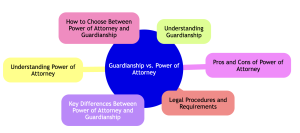Introduction to Guardianship and Power of Attorney
Guardianship and power of attorney are legal mechanisms that help manage decisions for those who can no longer do so themselves.
However, their purposes and applications differ.
Guardianship often involves a court-appointed individual making decisions for someone who is incapacitated.
In contrast, a power of attorney (POA) allows a designated person to act on behalf of another under specific circumstances.
Knowing when and how to use each can significantly impact the autonomy and rights of the individual involved.
Montana Elder Law has extensive experience with Guardianship and PoA in Montana, let us help!
Key Takeaways
- Definition and scope of a power of attorney: A legal document allowing one person to act on another’s behalf.
- Definition and scope of guardianship: A court-appointed role for managing the affairs of someone unable to do so.
- Situations where each is most beneficial: POA for proactive decision-making; guardianship for when someone is already incapacitated.
- Legal processes involved in establishing each: POA requires documentation and sometimes notarization; guardianship involves a court process.
- Impact on the individual’s rights and autonomy: POA maintains some personal control; guardianship often results in significant loss of personal rights.

What is Power of Attorney?
A power of attorney (POA) grants someone the authority to act on behalf of another person. It comes in three main types: general, durable, and limited.
A general POA offers broad powers over financial and legal matters, a durable POA remains effective even if the principal becomes incapacitated, and a limited POA grants specific powers for particular tasks or times.
A POA becomes effective upon signing or, in some cases, only when the principal is incapacitated (springing POA).
The principal can revoke it at any time if they are mentally competent by destroying the document, creating a new one, or providing written notice to the agent and relevant institutions.
Key Points:
- General POA: Broad authority over financial and legal matters.
- Durable POA: Effective even if the principal is incapacitated.
- Limited POA: Specific powers for particular tasks or times.
- Springing POA: Activates upon the principal’s incapacitation.
- Revocation: Done by the principal through destruction, new document, or written notice.
What is Guardianship?
Guardianship is a legal relationship established by a court, granting someone authority to make decisions for another who cannot do so due to incapacity from age, illness, or disability.
Unlike a POA, which is voluntarily initiated, guardianship is court-imposed, typically as a last resort.
Establishing guardianship involves a formal court process where a petition is filed, evidence of incapacity is provided, and a hearing is held. If the court deems it necessary, a guardian is appointed to manage the ward’s personal, financial, and medical decisions.
Guardians have extensive responsibilities and must regularly report their actions to the court.
Key Points:
- Initiation: Court-imposed for those who cannot manage their affairs.
- Process: Filing a petition, presenting evidence, and attending a hearing.
- Authority: Substantial control over personal, financial, and medical decisions.
- Responsibilities: Managing finances, healthcare, and overall well-being.
- Reporting: Regular court reports on actions and the ward’s condition.
Key Differences Between Power of Attorney and Guardianship
Power of attorney and guardianship serve similar purposes but differ significantly in execution and scope.
A power of attorney is a voluntary arrangement initiated by an individual who appoints someone they trust to make decisions on their behalf. This can be done while the individual still has mental capacity.
In contrast, guardianship is imposed by the court when an individual is already incapacitated and unable to make decisions independently.
Comparison of Power of Attorney and Guardianship
| Aspect | Power of Attorney | Guardianship |
| Initiation Process | Initiated by the individual | Imposed by the court |
| Scope of Authority | Specified by the individual (general, durable, or limited) | Broad, court-defined authority |
| Revocability | Can be revoked by the individual | Can only be terminated by the court |
| Decision-Maker | Chosen by the individual | Appointed by the court |
| Impact on Rights | Maintains more individual autonomy | Often results in significant loss of rights |
Pros and Cons of Power of Attorney
A power of attorney (POA) provides several advantages and potential drawbacks.
One of the primary benefits of a POA is its flexibility.
It allows an individual to choose someone they trust to make decisions on their behalf. This can include various powers, from managing finances to making healthcare decisions.
POAs are also relatively easy to set up and can be tailored to meet an individual’s specific needs.
Another advantage is revocability; the principal can revoke the POA at any time, provided they are mentally competent.
However, there are risks associated with granting a POA.
Potential Risks of Power of Attorney
- Misuse of Power: The agent may misuse their authority, potentially leading to financial abuse or neglect of the principal’s needs.
- Necessity of Mental Capacity: The principal must have the mental capacity to establish a POA, which may not be feasible in cases of sudden incapacity.
- Lack of Oversight: Unlike guardianship, which involves regular court oversight, a POA relies heavily on the integrity of the agent.
How to Choose Between Power of Attorney and Guardianship
Assessing Current and Future Needs
When deciding between power of attorney (POA) and guardianship, it is important to evaluate the individual’s mental capacity and future health prospects.
If the person still has the mental capacity to make decisions, a POA might be the best option, allowing them to choose who will act on their behalf. However, if the individual is already incapacitated or is likely to become so soon, guardianship may be necessary. (1)
Legal and Financial Considerations
The legal and financial implications of POA and guardianship are significant.
Establishing a POA is typically straightforward and involves less legal intervention, making it a less costly and quicker option.
On the other hand, Guardianship involves a court process that can be lengthy and expensive. Additionally, guardianship results in the loss of many personal rights, while POA maintains more of the individual’s autonomy.
Considering these factors can help make an informed decision that balances legal requirements and financial realities.
Consulting with Legal Professionals
When choosing between POA and guardianship, consulting with an elder law attorney is highly recommended.
Here are key reasons to seek professional advice:
- Expert Guidance: Attorneys provide clarity on complex legal requirements.
- Personalized Solutions: Tailored advice based on individual circumstances.
- Document Preparation: Ensures all legal documents are correctly prepared.
- Court Representation: Essential for navigating the guardianship process.
- Long-term Planning: Helps in creating a plan that adapts to future needs.
Legal Procedures and Requirements
Setting up a power of attorney or guardianship involves specific legal procedures.
Steps Involved:
- Initial Assessment and Decision-Making: Evaluate the individual’s needs and decide which option is best.
- Preparing Necessary Legal Documents: Draft and sign the POA document, or prepare the guardianship petition.
- Court Involvement and Approval Process: For guardianship, file the petition and attend court hearings for approval.
- Ongoing Responsibilities and Monitoring: Manage the responsibilities as outlined in the POA or by the court in the case of guardianship, including regular reporting if required.
Guardianship and Power of Attorney: Advice from Montana Elder Law
Deciding between guardianship and power of attorney is a significant decision that impacts the care and autonomy of the individual involved. Power of attorney is ideal for those with mental capacity, offering flexibility and ease of setup. Guardianship is necessary when the individual is already incapacitated, providing a structured, court-supervised framework. Each option has its own set of pros and cons, which should be weighed carefully to make the best choice for the individual’s needs.
Montana Elder Law is a dedicated resource for anyone managing a guardianship or power of attorney situation.
We will provide you with sound legal advice. Our experienced attorneys will give you the attention you deserve and make sure everything goes as smoothly as possible, so you can focus on your family. Contact us today with questions!
Visit our HOMEPAGE for more information.
Reference:
(1) Montana Judicial Branch, Guardianship and Conservatorship, https://courts.mt.gov/forms/Guardianship




